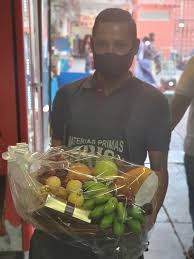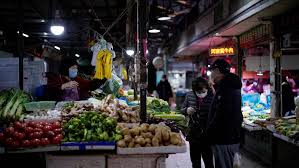BELIEVE IT OR NOT!… A CUBAN, WILBER MARTINEZ (LEI LONG), WHO SELL VEGETABLES IN CHINA.
It has been ten years since Wilber Martínez Niebla, a 44-year-old Cuban, came to China to join a music band that performed in various parts of the country. When he arrived in the town of Suzhou, he was deeply fascinated by the poetic charm of the river city, where he met his current wife from the southwestern Chinese province of Yunnan. It was then that he decided to settle down and now the couple has two children, a girl, and a boy.
Today he sells organic vegetables with his Chinese peers at the Shuangta Market in Suzhou City, Jiangsu Province.
Every morning the Cuban shouts in the market offering his products “Do you want some vegetables? Very tasty!”, Over and over again, the Cuban vendor calls out in Chinese behind a crowded vegetable stall, and then begins to sing out loud. Some shoppers lift their cell phones to take photos and nearby merchants, grinning from ear to ear, ask for another song as they continue their business.
That is the daily routine of the Shuangta Bazaar, located in the Gusu district of Suzhou city that covers an area of 2,000 square meters and was renovated from a vegetable market. Wilber owns No. 47 in the vegetable area and took “Lei Long” as his Chinese name.
In addition to collecting, weighing, and packing vegetables, the Cuban often wanders the bazaar to engage in conversation with the other vendors and has become a source of joy.
“It’s the best vegetable market,” says Lei Long (Wilber), the name the Cuban took when he arrived in China, who lived on a farm in Cuba since he was a child and was impressed when he saw for the first time how clean and tidy it could be. a vegetable market in China.
Unlike the other stalls, his is filled with potted organic vegetables and provides customers with bamboo baskets and woven bags instead of the typical plastic packaging.
“It is friendlier with the environment and the vegetables look more beautiful,” says the Cuban. As people experience greater material well-being, they pay more attention every day to protecting the environment, he adds.
“In my opinion, a modestly affluent society in China includes upholding a life that respects the environment and following the path of sustainable development,” says the seller.
A young owner of a vegetable stall in the He Yun place adds that she was proud to see foreign friends selling vegetables, as she brings an international flair to the market.
PLANS FOR HIS NEAR FUTURE
Due to the impact of the epidemic, Lei Long received few acting opportunities in 2020, but her family was very optimistic. Taking into account his experience in working in the fields and his love for gastronomy, the Cuban decided to start “selling vegetables to save himself.”
With the help of the Shuangta Street Administration Office in Gusu District, he successfully rented a stall and became a vegetable seller.
“I sell vegetables not only to earn money. The most important thing is to be able to do something meaningful and meet more friends by serving the residents of the area,” he says, after specifying that his family only sells organic vegetables.
Lei Long regularly drives to a base near Taihu Lake to transport local organic vegetables before sunrise. Also, in order to keep them alive longer, he sells them with his root. “This way customers can eat fresher vegetables when they get home,” he says.
“After the epidemic, and especially with the high standard of living that the younger generation has acquired, there is greater interest in eating organic vegetables, since they are healthier,” says the Cuban merchant, who is also willing to support farmers that are dedicated to the cultivation of this kind of food.
As the peak season for vegetable sales approaches for the Spring Festival, the Chinese Lunar New Year, his family is buying more and more vegetables from the farms.
Lei Long is very honored to see that young people love to walk around Shuangta Bazaar and buy vegetables. “Young people have a better understanding of the healthy lifestyle and I am very happy to be recognized for selling organic vegetables.”
In the future, the Cuban plans to take music as his hobby and accompany his family to sell vegetables in Suzhou, as he considers it a “happy and pleasant” practice, says Lei Long, the new Cuban in China.
CREALO O NO!..UN CUBANO, WILBER MARTINEZ (LEI LONG), QUE VENDE VERDURAS EN CHINA.
Hace ya diez años que Wilber Martínez Niebla, un cubano de 44 años, llegó a China para unirse a una banda de música que actuaba en varios lugares del país. Cuando llegó a el pueblo de Suzhou, quedó profundamente fascinado por el encanto poético de la ciudad fluvial, donde conoció a su actual esposa, proveniente de la provincia suroccidental china de Yunnan. Fue entonces cuando decidió asentarse y ahora la pareja tiene dos hijos, una niña y un varón.
Hoy vende verduras y hortalizas orgánicas junto a sus pares chinos en el mercado Shuangta de la ciudad de Suzhou, en la provincia de Jiangsu.
Todas las mañanas el cubano grita en el mercado ofreciendo sus productos “¿Te apetecen unas verduras? ¡Muy ricas!”, una y otra vez, vocea el vendedor cubano en idioma chino detrás de un puesto de verduras lleno de gente, y luego empieza a cantar a viva voz. Algunos compradores levantan sus celulares para tomar fotos y los comerciantes cercanos, sonriendo de oreja a oreja, piden otra canción mientras continúan sus negocios.
Esa es la rutina diaria del bazar Shuangta, ubicado en el distrito de Gusu de la ciudad de Suzhou que cuenta con una superficie de 2.000 metros cuadrados y fue renovado a partir de un mercado de verduras. Wilber es dueño del puesto número 47 del área de verduras y asumió “Lei Long” como su nombre chino.
Además de recoger, pesar y empacar verduras, el cubano a menudo recorre el bazar para entablar conversación con los demás vendedores y se ha convertido en fuente de alegría.
“Es el mejor mercado de verduras”, asegura Lei Long (Wilber), nombre que el cubano tomo cuando llego a China, que vivió desde niño en una granja en Cuba y quedó impresionado cuando vió por primera vez lo limpio y ordenado que podía ser un mercado de verduras en China.
A diferencia de los demás puestos, el suyo está lleno de vegetales orgánicos cultivados en macetas y proporciona a los clientes cestas de bambú y bolsas tejidas en lugar de los típicos embalajes de plástico.
“Es más amigable con el medio ambiente y las verduras se ven más hermosas”, refiere el cubano. A medida que las personas cuentan con un mayor bienestar material, prestan una mayor atención cada día a la protección del medio ambiente, añade.
“En mi opinión, una sociedad modestamente acomodada en China incluye defender una vida respetuosa con el medio ambiente y seguir el camino del desarrollo sostenible”, refiere el vendedor.
Una joven dueña de un puesto de verdura en el lugar He Yun, añade se refiere a que se sintió orgullosa al ver a amigos extranjeros vender hortalizas, ya que aporta un estilo internacional al mercado.
PLANES FUTUROS DEL CUBANO
Debido al impacto de la epidemia, Lei Long recibió pocas oportunidades de actuación en 2020, pero su familia se mostró muy optimista. Tomando en cuenta su experiencia en el trabajo del campo y su amor por la gastronomía, el cubano decidió comenzar a “vender verduras para salvarse”.
Con la ayuda de la oficina de administración de la calle Shuangta, en el distrito de Gusu, alquiló con éxito un puesto y se convirtió en un vendedor de verduras.
“Vendo verduras no solo por ganar dinero. Lo más importante es poder hacer algo significativo y conocer a más amigos al servir a los residentes del área”, cuenta, tras precisar que su familia solo vende vegetales orgánicos.
Lei Long conduce de forma regular a una base cercana al lago Taihu para transportar las verduras orgánicas locales antes del amanecer. Además, con el fin de mantenerlas vivas por más tiempo, las vende con su raíz. “De esta manera los clientes pueden comer hortalizas más frescas cuando lleguen a casa”, refiere.
“Tras la epidemia, y especialmente con el elevado nivel de vida que ha adquirido la generación más joven, hay mayor interés por comer vegetales orgánicos, ya que son más saludables”, asegura el comerciante cubano, quien también está dispuesto a apoyar a los agricultores que se dedican al cultivo de esta clase de alimentos.
A medida que se aproxima la temporada alta de venta de vegetales con motivo de la Fiesta de la Primavera, el Año Nuevo Lunar chino, su familia compra cada vez más verduras de las granjas.
Lei Long se siente muy honrado de ver que a los jóvenes les encanta pasear por el bazar Shuangta y comprar verduras. “Los jóvenes comprenden mejor el estilo de vida saludable y estoy muy feliz de ser reconocido por vender verduras orgánicas”.
En el futuro, el cubano planea tomar la música como su pasatiempo y acompañar a su familia a vender verduras en Suzhou, pues lo considera una práctica “feliz y agradable” asegura Lei Long, el nuevo cubano en China.
Agencies/ Xinhua/ Internet Photos/ Extractos/ Excerpts/ Arnoldo Varona/ www.TheCubanHistory.com
THE CUBAN HISTORY, HOLLYWOOD.












